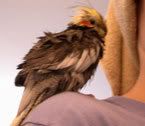Sometimes one idea leads to a different idea, one thought to another. The mind wanders.
One of my recent thought trains started with Wilson, a parakeet. One of my partner's coworkers found him at their wild bird feeder. The coworker managed to catch him (the bird let him get within towel-throwing range), and after contacting the local Parrot Society and avian vet (no lost parakeets reported) Wilson now lives with us.
We have two other small parrots, neither of which has ever expressed interest in the noises of radio or television. Wilson, on the other hand, not only gets makes noise in response to the radio, he actually seems to respond to the songs: he gets louder and softer with the music, and often will squawk preferentially on the beats.
The ability to recognize musical beats and perform an action in time with them (such as a squawk or a head bob) is known as entrainment. It used to be believed that only humans had this ability; in April of this year, evidence was published that this is a trait humans share with parrots.
Which in itself is kindof neat. Even more interestingly, the evidence was parrots entraining to the music preferred by their human owners. Other animals can be influenced by musical sounds; a recent study found that the moods of tamarins, a kind of monkey, was affected by music. But not by human music: only by music specially composed to resemble tamarin calls.
It is surprising that parrots, that are such distant relatives (they're not even mammals!), can relate to human music, while much more similar animals (monkeys) cannot. Perhaps the ability to enjoy music of a different species is tied to the ability to make a wide variety of vocalizations. To my knowledge, certain families of birds (parrots and corvids) are the only animals able to imitate human speech.
The ability to make a variety of complex vocalization may correlate to other traits. It was recently suggested that, for evolutionary reasons, complex and varied songs are strongly associated with avian intelligence.
And so it goes, me listening to Wilson cheep while wondering about what evolutionary pressures were shared between his ancestors and mine. I have a wandering mind.
Sunday, September 27, 2009
The science of parrots
Subscribe to:
Post Comments (Atom)

No comments:
Post a Comment